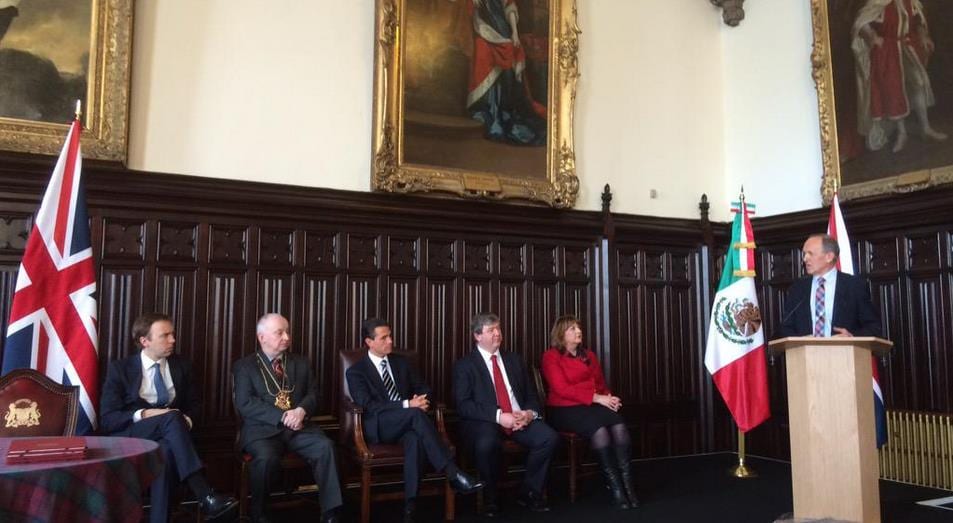UCL Energy Institute participates in Mexico’s President round table on the opportunities of building a sustainable energy economy in the UK and Mexico
By ucftbso, on 13 April 2015

James Smith, Chairman of the Carbon Trust and ex-Chair of Shell UK moderated the discussion and summarised the outcome to the President of Mexico and UK government representatives.
Recently I took part in a high level round table on the opportunities of building a sustainable energy economy in the UK and in Mexico. The event was held on the occasion of the State Visit of the President of Mexico to the United Kingdom. This was a select roundtable discussion building on a dialogue initiated in Campeche, Mexico during HRH The Prince of Wales’s visit in November 2014. The roundtable was held in conjunction with the Department of Energy and Climate Change and the Foreign and Commonwealth Office; its aim was to debate areas of future co-operation through knowledge and technology transfer that will help each nation successfully meet their mutually ambitious carbon reduction targets, whilst addressing the challenges posed by the transition to a low carbon energy system.
Participants at this private meeting included the Secretary of the Mexican Ministry of Environment and Natural Resources (SEMARNAT), the Undersecretary of the Mexican Ministry of Energy (SENER), the Ambassador of Mexico to the OECD, representatives from the UK’s Department of Energy and Climate Change (DECC), academics from leading British universities, as well as CEOs and Directors from the Mexican Institute of Ecology and Climate Change (INECC), the Foreign Commonwealth Office (FCO), PEMEX, Shell, BG-Group, ETI, McKinsey and RBS, amongst others.
Mexico’s energy industry is undergoing significant changes following recent reforms that open deep-water oil and shale fields to foreign investment, as well as liberalising the electricity industry. This has awakened considerable interest from oil and gas capitals in particular, as well as from energy business leaders and government representatives. Equally, the Mexican government is keen to attract investments and to establish collaborations with key players in the energy industry in order to increase the probability and degree of success of the energy reforms. This prompted President Peña Nieto’s visit to Scotland to speak to energy leaders across the business and education sectors, as well as to witness the signing of Memoranda of Understanding (MoU) between Mexico and the UK on energy and climate change; between PEMEX and UK Export Finance on energy financing and business development and between the University of Aberdeen and PEMEX on education and training for oil & gas personnel in Mexico.
During my participation I highlighted energy systems modelling in aid of policy-making as an important area of collaboration between both countries. I pointed out that the modelling work carried out by UKERC (with a strong participation from UCL colleagues) using UK MARKAL between 2007-2012 was instrumental in informing the UK’s Committee on Climate Change and the Department of Energy and Climate Change in preparation of the 4th carbon budget. Modelling different projections of the UK energy system to 2050 highlighted key challenges and provided insight into the impact of different commodity prices, technology options, resource availability scenarios and government policies on the cost and feasibility of achieving climate targets. Some key messages from this research work are highly relevant to the Mexican energy system, as well as the methodology used to obtain them. With this in mind, the UCL Energy Institute is in advanced negotiations with Mexico’s Secretariat of Energy to develop a multi-regional energy systems model for Mexico.
By Baltazar Solano-Rodriguez
Research Associate in Energy Systems at UCL Energy Institute
 Close
Close

